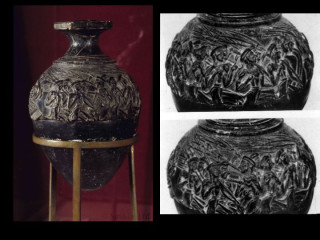The Harvester Vase, a stunning artifact from the Late Bronze Age, stands as a testament to the artistic and technological achievements of the Minoan civilization. Dating back at least 3500 years to approximately 1550-1500 BC, this artifact was discovered at Hagia Triada, an ancient Minoan “palace” site nestled in the southern region of Crete, Greece.
A Glimpse into Minoan Artistry
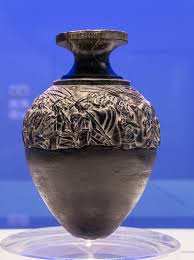
Crafted from black steatite, the Harvester Vase was originally composed of three parts, although the lowest section is now missing and replaced with modern undecorated plaster. This small yet exquisite vessel measures about 4 inches in height and 4.5 inches in diameter at its widest point. Archaeologists speculate that the vase may have been adorned with gold leaf, enhancing its elegance and prestige.
Hagia Triada: Gateway to Minoan Civilization
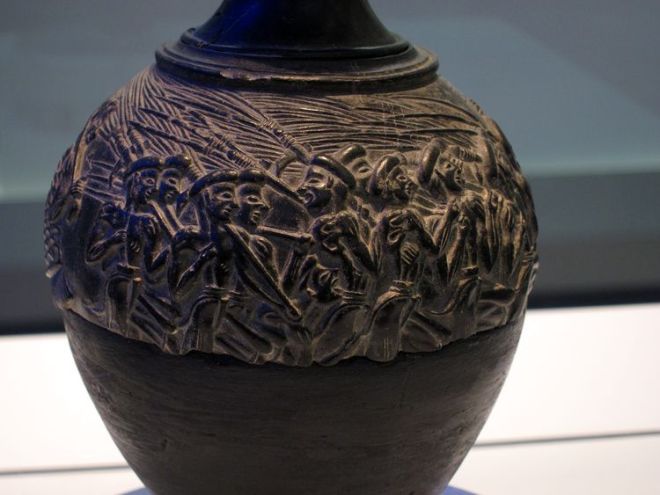
Hagia Triada, explored extensively since the early 20th century, has yielded invaluable insights into Minoan life during the Second Palace Period (around 1700-1450 BC). This archaeological site has revealed treasures such as Linear A tablets, offering glimpses into Minoan writing and administrative practices. The discovery of the Harvester Vase by the Italian School of Archaeology at Athens in 1902 marked a significant milestone in the understanding of Minoan art and culture.
The Legacy of Minoan Civilization
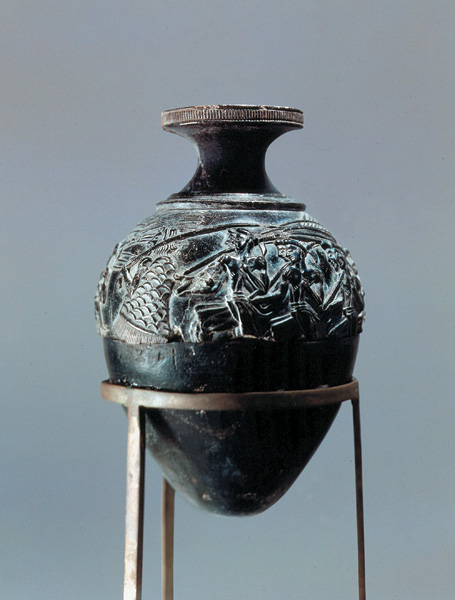
The Minoans, known for their advanced pottery, metalwork, and urban planning, thrived on Crete millennia ago. The intricate designs and craftsmanship seen in artifacts like the Harvester Vase illustrate their mastery of materials and artistic expression. This particular vase, with its symbolic imagery and possible ceremonial use, underscores the spiritual and agricultural significance within Minoan society.
Preserving History at Heraklion
Today, the Harvester Vase finds its home at the Heraklion Archaeological Museum in Heraklion, Greece. Here, visitors can marvel at its delicate beauty and learn about its cultural and historical context. The museum not only preserves the vase but also educates visitors about the rich heritage of the Minoans and their enduring impact on art and civilization.
Discovering the Harvester Vase
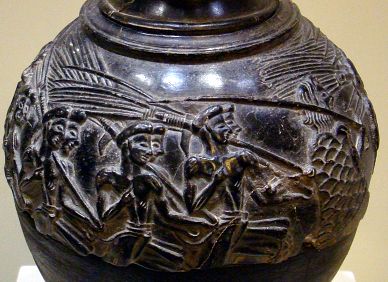
The Harvester Vase continues to inspire awe and curiosity, offering a window into a distant past where art, ritual, and daily life intertwined on the island of Crete. Its discovery at Hagia Triada remains a testament to the ongoing archaeological endeavors that illuminate the complexities of Minoan civilization and its enduring legacy in the Mediterranean world.
Conclusion
The Harvester Vase of Hagia Triada stands as a timeless example of Minoan artistry and cultural sophistication. As scholars and archaeologists delve deeper into its secrets, it continues to enrich our understanding of ancient Crete and the vibrant civilization that flourished there over three millennia ago. Through artifacts like the Harvester Vase, we glimpse the ingenuity and creativity of the Minoans, echoing through time and inspiring fascination with each new revelation.
